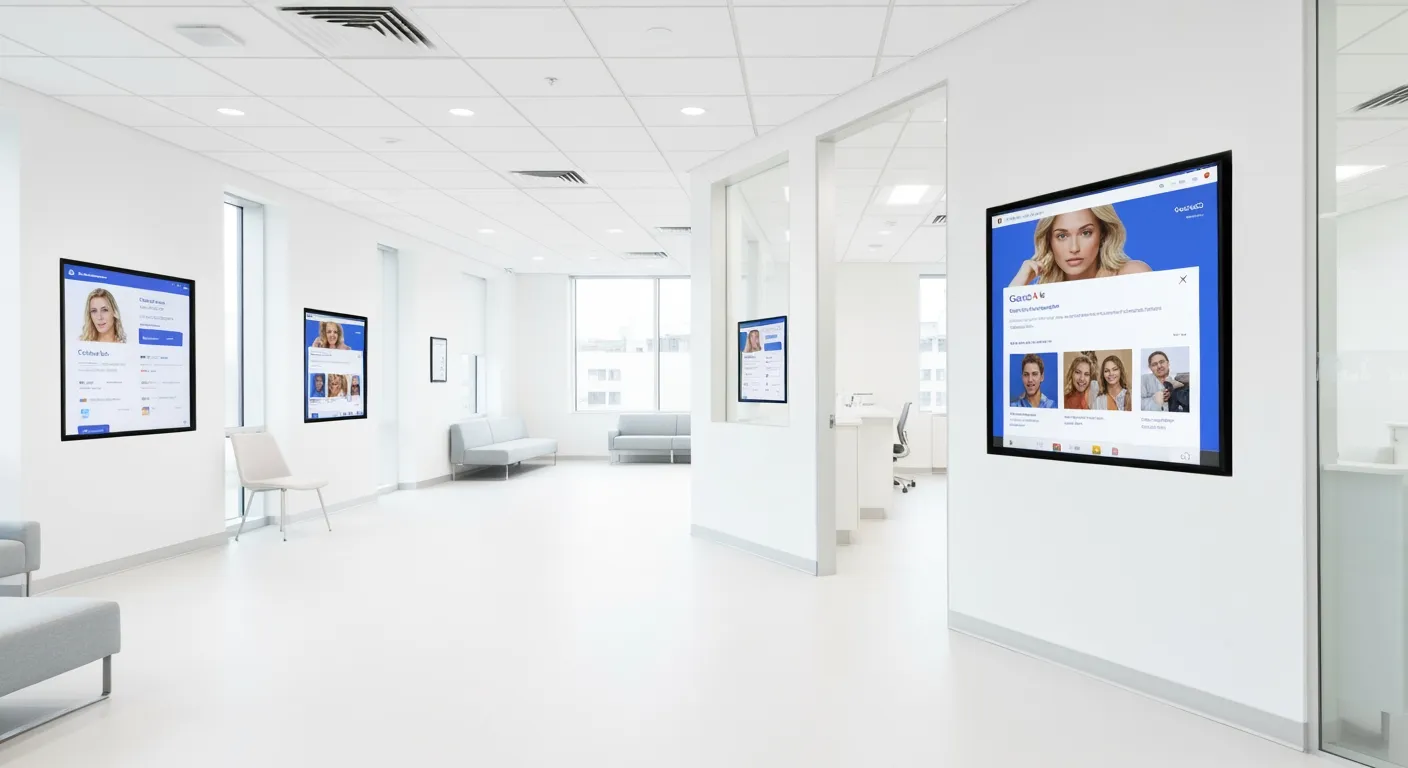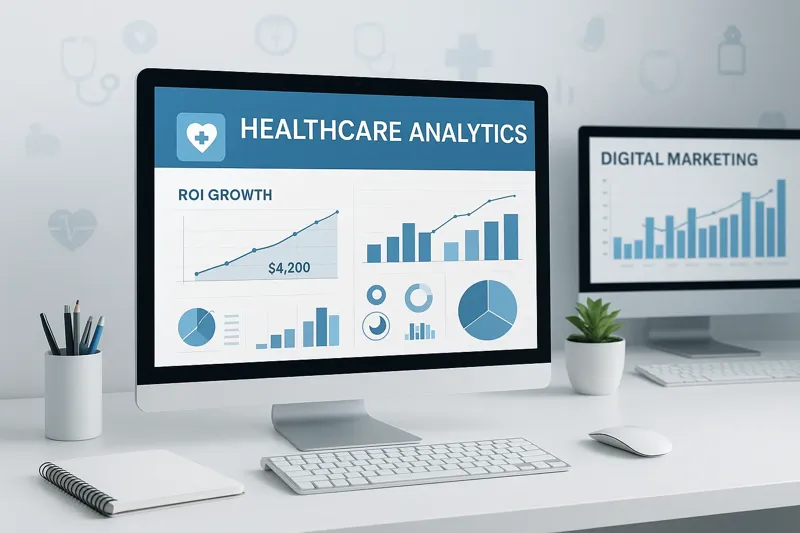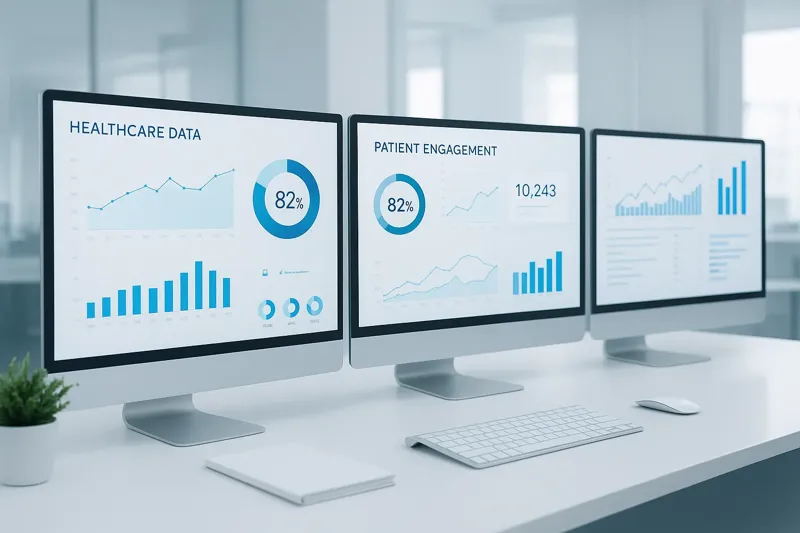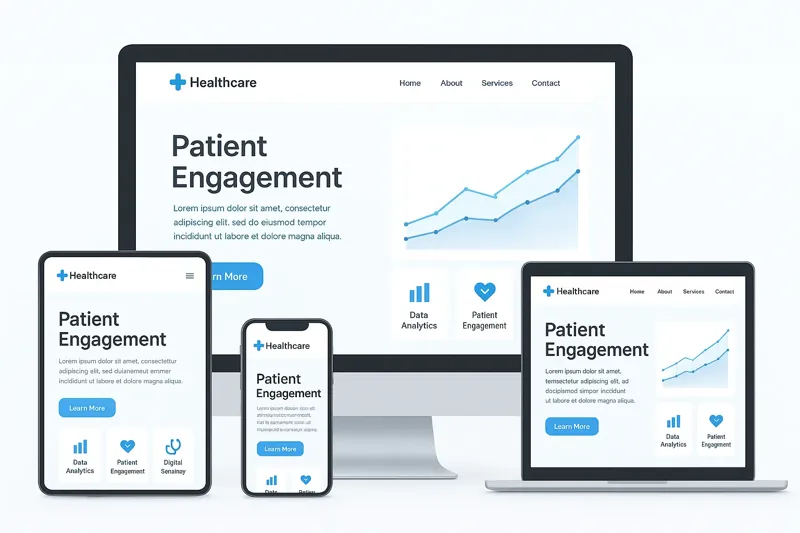Driving Patient Growth Through Strategic PPC Campaigns
In the rapidly evolving digital landscape, medical practices must leverage effective online marketing to attract high-value patients and maintain competitive advantage. Google Ads and PPC advertising provide healthcare providers with targeted, measurable, and cost-effective avenues to increase visibility, capture patient intent, and grow practice revenue. This article explores key strategies, compliance considerations, optimization techniques, and expert insights essential for maximizing Google Ads and PPC performance tailored specifically for medical practices.
The Power of Google Ads and PPC for Medical Practices
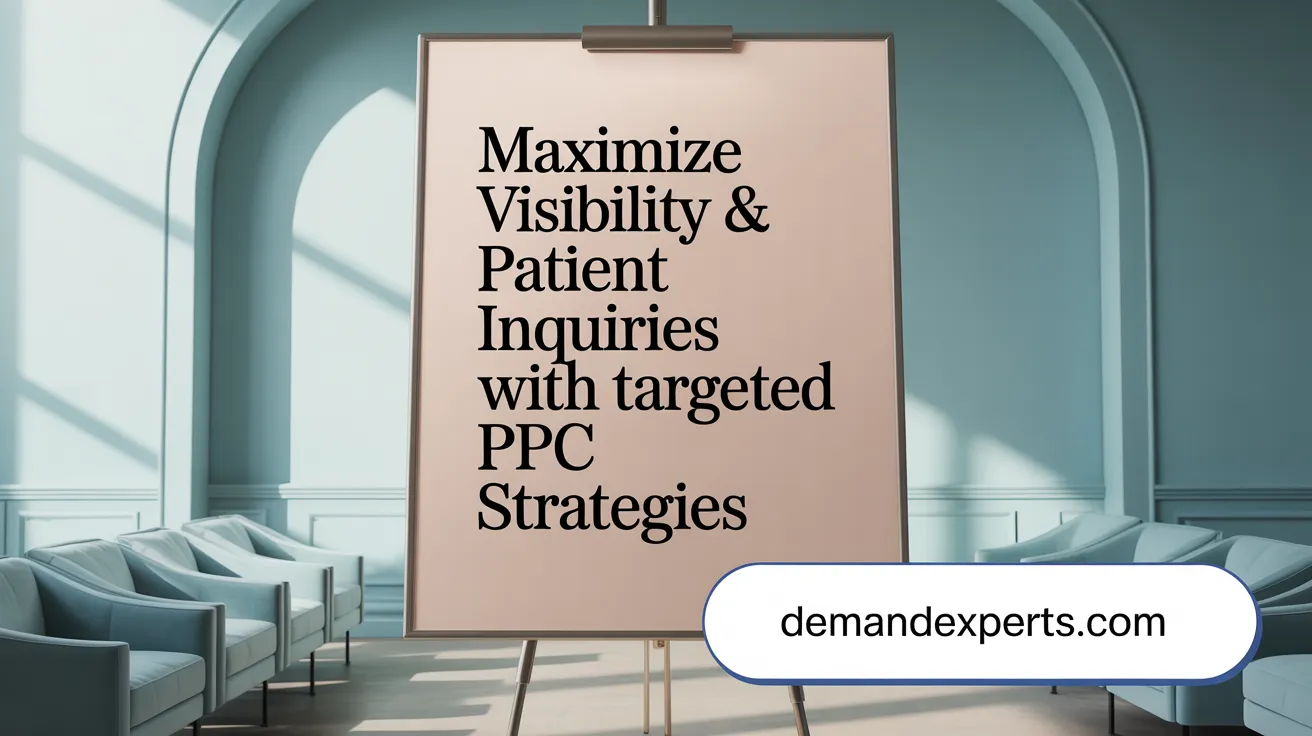
What is Pay-Per-Click Advertising and Why is it Effective for Medical Practices?
Pay-per-click (PPC) advertising is an online marketing approach where medical practices pay only when someone clicks on their ads, making it a highly cost-effective method. This model helps practices reach potential patients who are actively searching for healthcare services, placing ads prominently at the top of search engine results like Google. Such visibility drives immediate traffic and patient inquiries, making it especially beneficial for clinics looking to grow quickly.
How Does PPC Provide Immediate Visibility?
Unlike SEO, which can take months to show results, PPC campaigns offer almost instant presence on search engines. When someone searches for terms like "dermatologist near me" or "pediatric dental appointment," PPC ads ensure your practice appears at the top of these local, high-intent searches. This rapid exposure can translate into timely appointment bookings and increased patient acquisition.
Why is PPC Cost-Effective and How Can Budget Be Managed?
Since payment happens only when a user clicks an ad, medical practices avoid wasting funds on uninterested viewers. This pay-per-click structure is particularly advantageous for smaller practices with limited budgets. Advertisers can set daily or monthly spend limits and adjust bids based on performance metrics, helping maintain strict budget control and better return on investment (ROI).
How Does Targeting Work to Reach Active Healthcare Searchers?
Google Ads allows precision targeting options such as geo-targeting, demographic filters, and behavioral segments. This means ads reach patients looking specifically for local healthcare providers offering certain services. By focusing on relevant locations and patient demographics, PPC campaigns enhance ad relevance, improving the chances of appointment bookings.
What Role Do High-Intent Keywords Play?
Using well-researched, high-intent keywords captures patients ready to take action. Keywords including specific conditions, services, or local phrases—like "urgent care open now" or "orthopedic clinic in [city]"—help attract users with genuine healthcare needs, reducing unqualified clicks and increasing conversion rates.
How Can Medical Practices Control Their PPC Budgets Effectively?
Practices can define maximum daily and monthly spending caps, allocate budgets to campaigns aligned with the most important service lines, and continuously monitor key performance indicators (KPIs) such as click-through rates (CTR) and cost per acquisition (CPA) to optimize spending. This proactive control prevents overspending and ensures the budget supports sustainable patient growth.
Strategic Keyword Research: The Cornerstone of Campaign Success
How should medical practices approach keyword research for Google Ads?
Medical practices should prioritize thorough keyword research to maximize the effectiveness of their Google Ads for Medical Practices campaigns. Using specialized tools like Google Keyword Planner allows them to identify high-performing keywords that are directly relevant to their medical specialties and services.
Keyword Research Tools
- Google Keyword Planner: Essential for discovering new relevant keywords and assessing search volume and competition.
- SEMrush and Ahrefs: Help analyze keyword competitiveness and track competitor keyword strategies.
Identifying High-Performing Keywords
Focusing on high-intent keywords is crucial—terms patients actively use when seeking specific medical services. Including local keywords (e.g., “pediatric dentist in Dallas”) targets nearby patients, increasing relevance and appointment booking potential.
Local and Service-Specific Keywords
Local keywords combined with service-specific phrases help practices reach ideal audiences. For example, "urgent care near me" or "orthopedic surgeon in [City]" combine geographic and specialty targeting as described in Geo-targeting in Healthcare PPC campaigns.
Long-Tail and High-Intent Keywords
Long-tail keywords, which are more specific search phrases, better match patient intent and typically have less competition. They attract qualified leads who are further along in the decision-making process, a strategy outlined in Effective PPC Campaigns.
Competitor Keyword Analysis
Analyzing competitors’ keyword usage provides insights into market trends and gaps. This ensures campaigns differentiate the practice while capturing unmet patient search needs, as noted in Analyzing Competitors' Google Ads.
Balancing Search Volume and Competition
Successful campaigns balance search volume (frequency of keyword searches) with competition level to target keywords that yield high-quality traffic without excessive costs. Learn more about balancing these factors in Improving Google Ads Performance.
In summary, a methodical, data-driven keyword research strategy incorporating local, long-tail, and competitor-informed keywords is essential for driving relevant traffic and boosting conversions in medical Google Ads campaigns. For a comprehensive guide, see Mastering Google Ads for Healthcare Professionals.
Precision Targeting: Geo-Targeting and Audience Segmentation
What targeting options enhance the effectiveness of medical PPC campaigns?
Medical PPC campaigns achieve greater success through several precise targeting options designed to connect with the most relevant patient audiences.
Geo-targeting local patients allows healthcare practices to serve ads specifically to users within a certain geographic area, ensuring visibility to potential patients nearby. This local focus is critical in healthcare since patient visits tend to be location-dependent.
Demographic and behavioral filters refine the audience based on age, gender, income level, and online behavior patterns. By tailoring ads to these specifics, practices increase the relevance of their messaging and appeal to patients most likely to engage.
Audience segmentation strategies divide patient populations into distinct groups based on conditions, treatment interests, or engagement history. Segmenting audiences enables the delivery of highly personalized ads and content, enhancing patient connection and trust.
Remarketing and retargeting efforts re-engage users who have previously visited the practice’s website but didn’t complete an appointment or inquiry. This helps maintain brand awareness and nurtures potential patients along the decision journey.
Device and time-based targeting optimize campaign performance by delivering ads to users on mobile devices—acknowledging the high volume of healthcare searches on smartphones—and scheduling ads to appear at times when patients are more likely to seek care.
Together, these targeting tactics increase ad relevance and patient conversions by aligning marketing efforts with where, when, and how prospective patients search for healthcare services.
Crafting Compelling and Compliant Ad Copy

How can medical practices write effective and compliant ad copy for Google Ads?
Creating effective Google Ads for medical practices requires a balance between engaging messaging and strict compliance with healthcare regulations. Start with writing engaging headlines that clearly address common patient concerns and highlight the services offered. Headlines should be concise, relevant, and tailored to the targeted keywords to capture attention immediately.
Include clear calls-to-action (CTAs) such as "Book an Appointment," "Call Now," or "Get Your Consultation" to drive potential patients towards taking the next step. The CTAs must be easy to understand and stand out in the ad copy.
Aligning the ad copy with patient pain points helps create empathetic messaging that resonates and builds trust. Focus on the benefits of the service, the quality of care, and reassurance about the patient experience.
Always avoid misleading claims or unverified promises. Ads must not exaggerate outcomes, use superlatives without evidence, or imply guaranteed results. Including any protected health information (PHI) violates privacy laws such as HIPAA and must be strictly avoided. For more on Google Ads compliance for healthcare and official policies on healthcare advertising laws, refer to the detailed guidelines provided by Google.
Healthcare compliance in advertising is essential. Ensure all claims are truthful, substantiated, and comply with legal guidelines like HIPAA, FTC rules, and Google’s healthcare advertising policies. This reduces risk and maintains patient trust.
Leverage ad extensions for medical practices to increase ad visibility and provide additional patient touchpoints. Use site links to direct users to specific service pages, call buttons for direct connection, and location extensions to display the practice’s address, all making it easier for patients to engage immediately.
Regularly review and update your ad copy to maintain relevance, improve quality scores, and optimize your return on investment. Combining empathetic, clear messaging with compliance and functional ad extensions results in effective Google Ads campaigns for healthcare providers.
Optimizing Landing Pages for Higher Conversion Rates
Why are optimized landing pages critical for PPC success in medical practices?
Optimized landing pages are essential because they create a seamless, relevant experience that matches the user's intent triggered by the ad click. When a prospective patient clicks on a Google Ads for medical services, they expect to find information that directly addresses their search terms and needs. Consistency between the ad copy, keywords, and landing page content enhances credibility and encourages users to take the next step.
Landing page relevance and consistency
Each landing page should be tightly aligned with the corresponding ad campaign's keywords and messaging. Customized landing pages for specific medical services or conditions ensure that visitors quickly find the precise information they seek, reducing bounce rates and boosting conversion rates.
Mobile responsiveness
Given the high volume of healthcare-related searches on mobile devices, landing pages must be fully optimized for smartphones and tablets. A mobile-responsive design adapts layout and navigation for smaller screens, improving accessibility and user satisfaction.
Clear call-to-action
Strong, prominent calls-to-action (CTAs) such as "Book an Appointment," "Call Now," or "Request a Consultation" guide visitors toward converting. CTAs should be visible without clutter and immediately actionable, facilitating easy patient engagement. Learn more about Healthcare Click-to-Call Features.
Fast loading times
Speed is critical; slow-loading pages frustrate users and lead to lost opportunities. Practices should optimize media sizes, reduce unnecessary scripts, and choose reliable hosting to ensure pages load quickly. Insights on improving conversion rates with fast-loading landing pages are helpful here.
Trust-building elements
Including testimonials, physician credentials, certifications, and HIPAA compliance assurances builds patient confidence. These elements reassure visitors about the practice’s professionalism, helping overcome hesitation.
By focusing on these factors, medical practices can transform clicks into confirmed appointments, making PPC investments more profitable and sustainable.
Compliance and Ethical Considerations in Healthcare PPC
What compliance issues must medical practices consider when running Google Ads campaigns?
Medical practices must strictly adhere to HIPAA compliance in ads by ensuring that Protected Health Information (PHI) is never included in ads or tracking mechanisms. Avoiding PHI protects patient privacy and aligns with legal requirements.
Google has detailed healthcare advertising policies that restrict ads promoting prescription drug sales, certain treatments, or unapproved substances. Only certified providers can advertise specific services like online pharmacies or addiction recovery, respecting location-specific legal frameworks.
Truthful and non-misleading claims are critical to maintain patient trust and comply with ethical advertising standards. Practices must avoid exaggerated promises, misleading images, or unsubstantiated medical claims in their ads.
Due to the complexity and sensitivity of healthcare advertising rules, partnering with professional agencies specializing in healthcare PPC ensures campaigns remain compliant and effective. Such agencies offer expertise in navigating regulatory frameworks, optimizing ad performance, and providing transparent reporting.
Overall, strict compliance combined with ethical marketing fosters trust, legal safety, and long-term success in healthcare PPC advertising.
Mobile Optimization and Ad Extensions: Enhancing Patient Engagement
Why Is Mobile Optimization Important for Healthcare Google Ads?
Mobile devices account for a significant portion of healthcare-related searches as many patients look for medical services on the go. Mobile-Optimized Healthcare Campaigns ensure that ads display correctly on smartphones and tablets, providing a seamless user experience. A critical feature is Healthcare Click-to-Call Features, which allows potential patients to call a medical practice directly from the ad with a simple tap, encouraging immediate contact and appointment bookings.
What Are Ad Extensions and How Do They Help?
Ad extensions add extra information and interactive buttons to Google Ads, significantly enhancing their effectiveness. Key extension types include:
- Call Extensions: Enable users to call the practice instantly (Call Extensions for Doctor Ads).
- Location Extensions: Show the practice’s address and a map link, guiding local patients (Healthcare Ad Extensions).
- Sitelink Extensions: Direct users to specific service pages like appointment booking or specialties (Sitelink, Call, and Location Extensions).
These extensions make ads more informative and engaging, increasing their relevance and click-through rates (Ad Extensions to Enhance Visibility.
How Does Mobile Optimization and Ad Extensions Improve Google Ads Performance?
Mobile optimization paired with strategic use of ad extensions improves patient engagement by making it easier to connect with the practice and find relevant information quickly. Enhanced ad visibility, combined with shortcuts to critical actions, translates to higher click-through and conversion rates (Optimizing Google Ads Campaigns. This optimized experience is vital given the competitive Pay-Per-Click (PPC) advertising in healthcare space and the need to convert searchers into patients efficiently (Maximize Google Ads for Doctors.
Ongoing Campaign Management: Tracking, Testing, and Optimization

What are best practices for optimizing Google Ads campaigns for medical practices?
Optimizing Google Ads campaigns for medical practices requires constant attention to performance metrics. Key performance indicators (KPIs) such as click-through rate (CTR), conversion rate, and Quality Score should be regularly monitored. These metrics offer insights into how well ads engage potential patients and lead to meaningful actions like appointment bookings. For comprehensive guidelines, see resources on Optimizing Google Ads Campaigns and Google Ads Best Practices for Healthcare.
How can A/B testing improve ad performance?
A/B testing different versions of ad copy and bidding strategies helps identify the most effective messaging and bid adjustments. By systematically comparing headlines, descriptions, and calls-to-action, medical practices can refine ads to better resonate with their target audience, boosting click and conversion rates. For more details on A/B testing and optimizing PPC ads, see expert guidelines.
Why is managing negative keywords important?
Negative keyword management prevents ads from showing on irrelevant or low-intent searches, which saves budget and improves campaign efficiency. Continuously reviewing search terms and excluding unrelated queries helps focus ad spend on high-value potential patients. Learn about negative keyword management in healthcare ads for best practices.
How should budgets be adjusted?
Budgets need to be flexible and aligned with campaign performance. Increasing funding for well-performing ads and scaling back on underperforming ones helps maximize return on investment (ROI). Regular budget reviews based on data-driven insights ensure cost-effective patient acquisition. Explore budgeting strategies for PPC campaigns tailored to healthcare providers.
What role do analytics tools play?
Using analytics platforms like Google Analytics provides deep insights into user behavior, conversion tracking, and overall campaign impact. These tools support informed decisions by revealing which ads and keywords drive patient engagement, enabling continuous optimization. For more on monitoring Google Ads performance and analytics, see detailed resources, and for the Role of analytics tools in healthcare PPC optimization.
Regularly updating campaigns by combining KPI monitoring, A/B testing, budget adjustment, and negative keyword management ensures that medical practices maintain high ad relevance, efficient spending, and strong ROI in their Google Ads for medical practices efforts.
Leveraging Multi-Channel Paid Advertising: Complementing Google Ads with Social Media
How can medical practices complement Google Ads with social media advertising?
Medical practices looking to maximize their online reach and patient acquisition benefit greatly from integrating Google Ads for medical practices with social media advertising, particularly Facebook Ads for medical marketing. While Pay-Per-Click (PPC) advertising in healthcare excels at capturing patients actively searching for relevant healthcare services, social media ads enhance brand awareness and patient trust earlier in the decision-making process.
Facebook Ads and other social platforms leverage demographic and behavioral data to target specific audiences, such as age groups, interests, and local communities. This precise targeting makes it possible to engage potential patients who may not yet be actively searching but are likely to consider the practice in the future.
Retargeting features allow practices to reconnect with people who have previously interacted with their website or ads, thereby building stronger audience relationships and guiding individuals further along their patient journey.
A budget-conscious approach often involves dedicating modest amounts—typically between $500 to $1,000 monthly per platform—while closely tracking appointments and calls generated. This multi-platform strategy enables healthcare providers to efficiently reach patients at different points in their decision process without overspending.
Aligning messaging and campaigns between Google Ads and social media platforms ensures a cohesive patient experience. The synergy of search-network ads driving direct intent conversions paired with social media’s role in nurturing awareness creates multiple touchpoints, increasing the chances that prospective patients will choose the medical practice when ready to book.
Using both Google Ads and social media advertising strategically expands the overall marketing impact, strengthens patient engagement, and enhances visibility across the patient journey, making them indispensable companions in modern healthcare marketing.
Partnering with Healthcare Marketing Experts to Maximize PPC Success
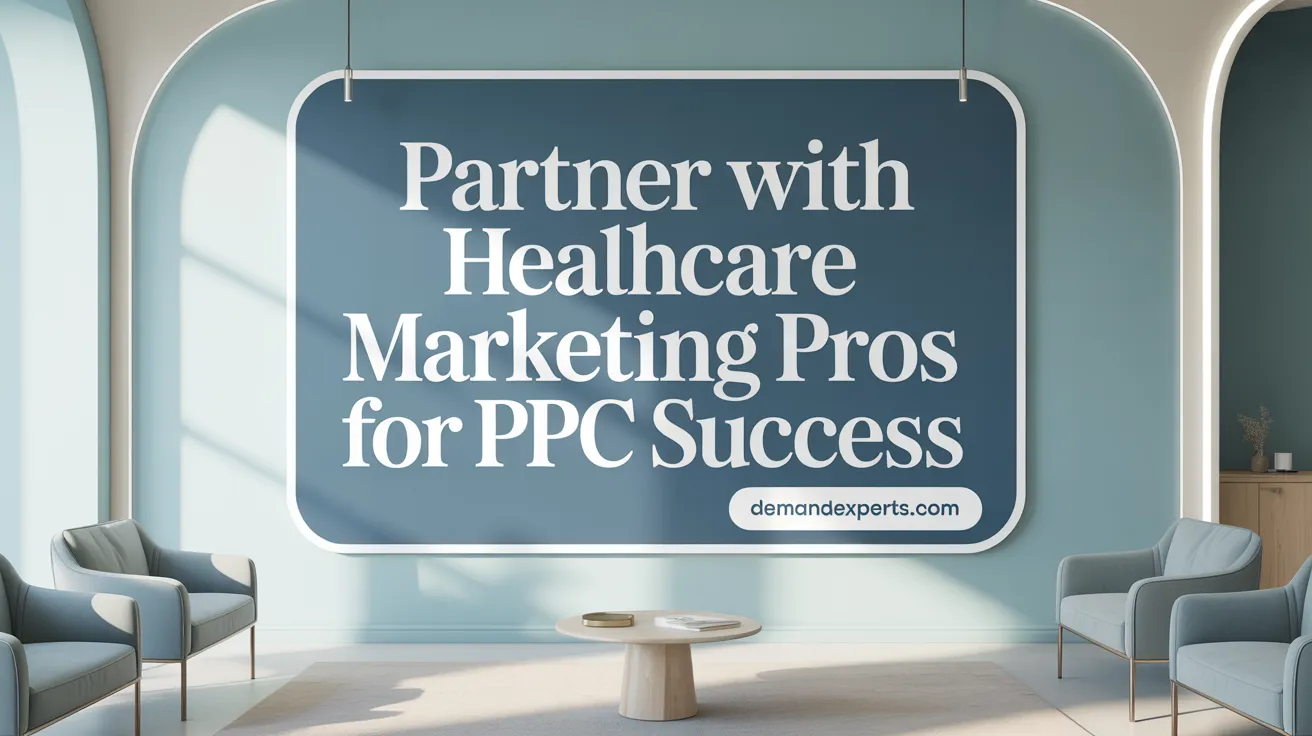
Why should medical practices work with specialized healthcare marketing agencies for PPC?
Medical practices benefit greatly from partnering with specialized healthcare marketing agencies when managing PPC campaigns. These agencies possess in-depth knowledge of healthcare regulations, including HIPAA compliance and Google’s strict advertising policies, ensuring campaigns avoid legal pitfalls.
Benefits of specialized healthcare PPC agencies
Healthcare marketing experts leverage healthcare-specific keyword targeting and audience segmentation to attract high-intent patients effectively. Their deep experience allows them to create campaigns tailored to the unique needs of medical practices, improving conversion rates and patient acquisition.
Expertise in compliance and healthcare regulations
These agencies maintain strict adherence to healthcare advertising standards, protecting patient privacy and avoiding misleading claims. They navigate complex certification requirements like LegitScript for prescription drug services, ensuring ads remain compliant and trustworthy.
Data-driven campaign setup and optimization
Utilizing advanced tools and analytics, healthcare PPC agencies set up organized, focused campaigns with precise geo-targeting and device optimization. They conduct continuous performance monitoring and A/B testing to optimize ad copy, keywords, and bidding strategies for maximum ROI (Ultimate Guide to PPC Campaign Performance.
Transparent pricing and ROI focus
Agencies typically offer clear pricing models such as flat fees or a percentage of ad spend, providing transparency. They emphasize measurable ROI through KPI tracking such as click-through rates, conversion rates, and cost-per-acquisition, enabling practices to gauge success and adjust budgets accordingly (Monitoring Google Ads Performance.
Case studies demonstrating practice growth
Proven results include significant patient volume increases and revenue growth for clients. For example, campaigns managed by agencies like DoctorLogic and PatientGain have led to hundreds of percentage increases in appointment bookings and millions in generated revenue for orthopedic and other specialty practices.
Saving time and improving performance
Outsourcing PPC management to specialists saves medical practices time and resources, allowing healthcare providers to focus on patient care. Expert agencies provide detailed performance insights and ongoing campaign refinement to continuously improve advertising outcomes (Improving PPC Performance).
By working with healthcare marketing experts, medical practices can harness the full power of PPC advertising in healthcare to efficiently attract high-value patients while maintaining strict compliance and achieving measurable growth.
Achieving Sustainable Growth Through Expert Google Ads and PPC Strategies
Maximizing Google Ads and PPC performance is essential for medical practices aiming to thrive in a competitive digital marketplace. By strategically conducting keyword research, meticulously targeting local and relevant audiences, crafting compliant and compelling ad copy, and optimizing landing pages for seamless conversions, healthcare providers can significantly increase patient acquisition and practice revenue. Continuous monitoring, mobile optimization, use of ad extensions, and integration with complementary platforms like Facebook Ads further enhance campaign effectiveness. Partnering with specialized healthcare marketing agencies ensures adherence to regulatory standards and leverages expert knowledge to deliver measurable, sustainable results. Embracing these best practices will empower medical practices to harness the full potential of PPC advertising, driving growth and establishing a trusted digital presence.
Driving Patient Growth Through Strategic PPC Campaigns
In the rapidly evolving digital landscape, medical practices must leverage effective online marketing to attract high-value patients and maintain competitive advantage. Google Ads and PPC advertising provide healthcare providers with targeted, measurable, and cost-effective avenues to increase visibility, capture patient intent, and grow practice revenue. This article explores key strategies, compliance considerations, optimization techniques, and expert insights essential for maximizing Google Ads and PPC performance tailored specifically for medical practices.
The Power of Google Ads and PPC for Medical Practices

What is Pay-Per-Click Advertising and Why is it Effective for Medical Practices?
Pay-per-click (PPC) advertising is an online marketing approach where medical practices pay only when someone clicks on their ads, making it a highly cost-effective method. This model helps practices reach potential patients who are actively searching for healthcare services, placing ads prominently at the top of search engine results like Google. Such visibility drives immediate traffic and patient inquiries, making it especially beneficial for clinics looking to grow quickly.
How Does PPC Provide Immediate Visibility?
Unlike SEO, which can take months to show results, PPC campaigns offer almost instant presence on search engines. When someone searches for terms like "dermatologist near me" or "pediatric dental appointment," PPC ads ensure your practice appears at the top of these local, high-intent searches. This rapid exposure can translate into timely appointment bookings and increased patient acquisition.
Why is PPC Cost-Effective and How Can Budget Be Managed?
Since payment happens only when a user clicks an ad, medical practices avoid wasting funds on uninterested viewers. This pay-per-click structure is particularly advantageous for smaller practices with limited budgets. Advertisers can set daily or monthly spend limits and adjust bids based on performance metrics, helping maintain strict budget control and better return on investment (ROI).
How Does Targeting Work to Reach Active Healthcare Searchers?
Google Ads allows precision targeting options such as geo-targeting, demographic filters, and behavioral segments. This means ads reach patients looking specifically for local healthcare providers offering certain services. By focusing on relevant locations and patient demographics, PPC campaigns enhance ad relevance, improving the chances of appointment bookings.
What Role Do High-Intent Keywords Play?
Using well-researched, high-intent keywords captures patients ready to take action. Keywords including specific conditions, services, or local phrases—like "urgent care open now" or "orthopedic clinic in [city]"—help attract users with genuine healthcare needs, reducing unqualified clicks and increasing conversion rates.
How Can Medical Practices Control Their PPC Budgets Effectively?
Practices can define maximum daily and monthly spending caps, allocate budgets to campaigns aligned with the most important service lines, and continuously monitor key performance indicators (KPIs) such as click-through rates (CTR) and cost per acquisition (CPA) to optimize spending. This proactive control prevents overspending and ensures the budget supports sustainable patient growth.
Strategic Keyword Research: The Cornerstone of Campaign Success
How should medical practices approach keyword research for Google Ads?
Medical practices should prioritize thorough keyword research to maximize the effectiveness of their Google Ads for Medical Practices campaigns. Using specialized tools like Google Keyword Planner allows them to identify high-performing keywords that are directly relevant to their medical specialties and services.
Keyword Research Tools
- Google Keyword Planner: Essential for discovering new relevant keywords and assessing search volume and competition.
- SEMrush and Ahrefs: Help analyze keyword competitiveness and track competitor keyword strategies.
Identifying High-Performing Keywords
Focusing on high-intent keywords is crucial—terms patients actively use when seeking specific medical services. Including local keywords (e.g., “pediatric dentist in Dallas”) targets nearby patients, increasing relevance and appointment booking potential.
Local and Service-Specific Keywords
Local keywords combined with service-specific phrases help practices reach ideal audiences. For example, "urgent care near me" or "orthopedic surgeon in [City]" combine geographic and specialty targeting as described in Geo-targeting in Healthcare PPC campaigns.
Long-Tail and High-Intent Keywords
Long-tail keywords, which are more specific search phrases, better match patient intent and typically have less competition. They attract qualified leads who are further along in the decision-making process, a strategy outlined in Effective PPC Campaigns.
Competitor Keyword Analysis
Analyzing competitors’ keyword usage provides insights into market trends and gaps. This ensures campaigns differentiate the practice while capturing unmet patient search needs, as noted in Analyzing Competitors' Google Ads.
Balancing Search Volume and Competition
Successful campaigns balance search volume (frequency of keyword searches) with competition level to target keywords that yield high-quality traffic without excessive costs. Learn more about balancing these factors in Improving Google Ads Performance.
In summary, a methodical, data-driven keyword research strategy incorporating local, long-tail, and competitor-informed keywords is essential for driving relevant traffic and boosting conversions in medical Google Ads campaigns. For a comprehensive guide, see Mastering Google Ads for Healthcare Professionals.
Precision Targeting: Geo-Targeting and Audience Segmentation
What targeting options enhance the effectiveness of medical PPC campaigns?
Medical PPC campaigns achieve greater success through several precise targeting options designed to connect with the most relevant patient audiences.
Geo-targeting local patients allows healthcare practices to serve ads specifically to users within a certain geographic area, ensuring visibility to potential patients nearby. This local focus is critical in healthcare since patient visits tend to be location-dependent.
Demographic and behavioral filters refine the audience based on age, gender, income level, and online behavior patterns. By tailoring ads to these specifics, practices increase the relevance of their messaging and appeal to patients most likely to engage.
Audience segmentation strategies divide patient populations into distinct groups based on conditions, treatment interests, or engagement history. Segmenting audiences enables the delivery of highly personalized ads and content, enhancing patient connection and trust.
Remarketing and retargeting efforts re-engage users who have previously visited the practice’s website but didn’t complete an appointment or inquiry. This helps maintain brand awareness and nurtures potential patients along the decision journey.
Device and time-based targeting optimize campaign performance by delivering ads to users on mobile devices—acknowledging the high volume of healthcare searches on smartphones—and scheduling ads to appear at times when patients are more likely to seek care.
Together, these targeting tactics increase ad relevance and patient conversions by aligning marketing efforts with where, when, and how prospective patients search for healthcare services.
Crafting Compelling and Compliant Ad Copy

How can medical practices write effective and compliant ad copy for Google Ads?
Creating effective Google Ads for medical practices requires a balance between engaging messaging and strict compliance with healthcare regulations. Start with writing engaging headlines that clearly address common patient concerns and highlight the services offered. Headlines should be concise, relevant, and tailored to the targeted keywords to capture attention immediately.
Include clear calls-to-action (CTAs) such as "Book an Appointment," "Call Now," or "Get Your Consultation" to drive potential patients towards taking the next step. The CTAs must be easy to understand and stand out in the ad copy.
Aligning the ad copy with patient pain points helps create empathetic messaging that resonates and builds trust. Focus on the benefits of the service, the quality of care, and reassurance about the patient experience.
Always avoid misleading claims or unverified promises. Ads must not exaggerate outcomes, use superlatives without evidence, or imply guaranteed results. Including any protected health information (PHI) violates privacy laws such as HIPAA and must be strictly avoided. For more on Google Ads compliance for healthcare and official policies on healthcare advertising laws, refer to the detailed guidelines provided by Google.
Healthcare compliance in advertising is essential. Ensure all claims are truthful, substantiated, and comply with legal guidelines like HIPAA, FTC rules, and Google’s healthcare advertising policies. This reduces risk and maintains patient trust.
Leverage ad extensions for medical practices to increase ad visibility and provide additional patient touchpoints. Use site links to direct users to specific service pages, call buttons for direct connection, and location extensions to display the practice’s address, all making it easier for patients to engage immediately.
Regularly review and update your ad copy to maintain relevance, improve quality scores, and optimize your return on investment. Combining empathetic, clear messaging with compliance and functional ad extensions results in effective Google Ads campaigns for healthcare providers.
Optimizing Landing Pages for Higher Conversion Rates
Why are optimized landing pages critical for PPC success in medical practices?
Optimized landing pages are essential because they create a seamless, relevant experience that matches the user's intent triggered by the ad click. When a prospective patient clicks on a Google Ads for medical services, they expect to find information that directly addresses their search terms and needs. Consistency between the ad copy, keywords, and landing page content enhances credibility and encourages users to take the next step.
Landing page relevance and consistency
Each landing page should be tightly aligned with the corresponding ad campaign's keywords and messaging. Customized landing pages for specific medical services or conditions ensure that visitors quickly find the precise information they seek, reducing bounce rates and boosting conversion rates.
Mobile responsiveness
Given the high volume of healthcare-related searches on mobile devices, landing pages must be fully optimized for smartphones and tablets. A mobile-responsive design adapts layout and navigation for smaller screens, improving accessibility and user satisfaction.
Clear call-to-action
Strong, prominent calls-to-action (CTAs) such as "Book an Appointment," "Call Now," or "Request a Consultation" guide visitors toward converting. CTAs should be visible without clutter and immediately actionable, facilitating easy patient engagement. Learn more about Healthcare Click-to-Call Features.
Fast loading times
Speed is critical; slow-loading pages frustrate users and lead to lost opportunities. Practices should optimize media sizes, reduce unnecessary scripts, and choose reliable hosting to ensure pages load quickly. Insights on improving conversion rates with fast-loading landing pages are helpful here.
Trust-building elements
Including testimonials, physician credentials, certifications, and HIPAA compliance assurances builds patient confidence. These elements reassure visitors about the practice’s professionalism, helping overcome hesitation.
By focusing on these factors, medical practices can transform clicks into confirmed appointments, making PPC investments more profitable and sustainable.
Compliance and Ethical Considerations in Healthcare PPC
What compliance issues must medical practices consider when running Google Ads campaigns?
Medical practices must strictly adhere to HIPAA compliance in ads by ensuring that Protected Health Information (PHI) is never included in ads or tracking mechanisms. Avoiding PHI protects patient privacy and aligns with legal requirements.
Google has detailed healthcare advertising policies that restrict ads promoting prescription drug sales, certain treatments, or unapproved substances. Only certified providers can advertise specific services like online pharmacies or addiction recovery, respecting location-specific legal frameworks.
Truthful and non-misleading claims are critical to maintain patient trust and comply with ethical advertising standards. Practices must avoid exaggerated promises, misleading images, or unsubstantiated medical claims in their ads.
Due to the complexity and sensitivity of healthcare advertising rules, partnering with professional agencies specializing in healthcare PPC ensures campaigns remain compliant and effective. Such agencies offer expertise in navigating regulatory frameworks, optimizing ad performance, and providing transparent reporting.
Overall, strict compliance combined with ethical marketing fosters trust, legal safety, and long-term success in healthcare PPC advertising.
Mobile Optimization and Ad Extensions: Enhancing Patient Engagement
Why Is Mobile Optimization Important for Healthcare Google Ads?
Mobile devices account for a significant portion of healthcare-related searches as many patients look for medical services on the go. Mobile-Optimized Healthcare Campaigns ensure that ads display correctly on smartphones and tablets, providing a seamless user experience. A critical feature is Healthcare Click-to-Call Features, which allows potential patients to call a medical practice directly from the ad with a simple tap, encouraging immediate contact and appointment bookings.
What Are Ad Extensions and How Do They Help?
Ad extensions add extra information and interactive buttons to Google Ads, significantly enhancing their effectiveness. Key extension types include:
- Call Extensions: Enable users to call the practice instantly (Call Extensions for Doctor Ads).
- Location Extensions: Show the practice’s address and a map link, guiding local patients (Healthcare Ad Extensions).
- Sitelink Extensions: Direct users to specific service pages like appointment booking or specialties (Sitelink, Call, and Location Extensions).
These extensions make ads more informative and engaging, increasing their relevance and click-through rates (Ad Extensions to Enhance Visibility.
How Does Mobile Optimization and Ad Extensions Improve Google Ads Performance?
Mobile optimization paired with strategic use of ad extensions improves patient engagement by making it easier to connect with the practice and find relevant information quickly. Enhanced ad visibility, combined with shortcuts to critical actions, translates to higher click-through and conversion rates (Optimizing Google Ads Campaigns. This optimized experience is vital given the competitive Pay-Per-Click (PPC) advertising in healthcare space and the need to convert searchers into patients efficiently (Maximize Google Ads for Doctors.
Ongoing Campaign Management: Tracking, Testing, and Optimization

What are best practices for optimizing Google Ads campaigns for medical practices?
Optimizing Google Ads campaigns for medical practices requires constant attention to performance metrics. Key performance indicators (KPIs) such as click-through rate (CTR), conversion rate, and Quality Score should be regularly monitored. These metrics offer insights into how well ads engage potential patients and lead to meaningful actions like appointment bookings. For comprehensive guidelines, see resources on Optimizing Google Ads Campaigns and Google Ads Best Practices for Healthcare.
How can A/B testing improve ad performance?
A/B testing different versions of ad copy and bidding strategies helps identify the most effective messaging and bid adjustments. By systematically comparing headlines, descriptions, and calls-to-action, medical practices can refine ads to better resonate with their target audience, boosting click and conversion rates. For more details on A/B testing and optimizing PPC ads, see expert guidelines.
Why is managing negative keywords important?
Negative keyword management prevents ads from showing on irrelevant or low-intent searches, which saves budget and improves campaign efficiency. Continuously reviewing search terms and excluding unrelated queries helps focus ad spend on high-value potential patients. Learn about negative keyword management in healthcare ads for best practices.
How should budgets be adjusted?
Budgets need to be flexible and aligned with campaign performance. Increasing funding for well-performing ads and scaling back on underperforming ones helps maximize return on investment (ROI). Regular budget reviews based on data-driven insights ensure cost-effective patient acquisition. Explore budgeting strategies for PPC campaigns tailored to healthcare providers.
What role do analytics tools play?
Using analytics platforms like Google Analytics provides deep insights into user behavior, conversion tracking, and overall campaign impact. These tools support informed decisions by revealing which ads and keywords drive patient engagement, enabling continuous optimization. For more on monitoring Google Ads performance and analytics, see detailed resources, and for the Role of analytics tools in healthcare PPC optimization.
Regularly updating campaigns by combining KPI monitoring, A/B testing, budget adjustment, and negative keyword management ensures that medical practices maintain high ad relevance, efficient spending, and strong ROI in their Google Ads for medical practices efforts.
Leveraging Multi-Channel Paid Advertising: Complementing Google Ads with Social Media
How can medical practices complement Google Ads with social media advertising?
Medical practices looking to maximize their online reach and patient acquisition benefit greatly from integrating Google Ads for medical practices with social media advertising, particularly Facebook Ads for medical marketing. While Pay-Per-Click (PPC) advertising in healthcare excels at capturing patients actively searching for relevant healthcare services, social media ads enhance brand awareness and patient trust earlier in the decision-making process.
Facebook Ads and other social platforms leverage demographic and behavioral data to target specific audiences, such as age groups, interests, and local communities. This precise targeting makes it possible to engage potential patients who may not yet be actively searching but are likely to consider the practice in the future.
Retargeting features allow practices to reconnect with people who have previously interacted with their website or ads, thereby building stronger audience relationships and guiding individuals further along their patient journey.
A budget-conscious approach often involves dedicating modest amounts—typically between $500 to $1,000 monthly per platform—while closely tracking appointments and calls generated. This multi-platform strategy enables healthcare providers to efficiently reach patients at different points in their decision process without overspending.
Aligning messaging and campaigns between Google Ads and social media platforms ensures a cohesive patient experience. The synergy of search-network ads driving direct intent conversions paired with social media’s role in nurturing awareness creates multiple touchpoints, increasing the chances that prospective patients will choose the medical practice when ready to book.
Using both Google Ads and social media advertising strategically expands the overall marketing impact, strengthens patient engagement, and enhances visibility across the patient journey, making them indispensable companions in modern healthcare marketing.
Partnering with Healthcare Marketing Experts to Maximize PPC Success

Why should medical practices work with specialized healthcare marketing agencies for PPC?
Medical practices benefit greatly from partnering with specialized healthcare marketing agencies when managing PPC campaigns. These agencies possess in-depth knowledge of healthcare regulations, including HIPAA compliance and Google’s strict advertising policies, ensuring campaigns avoid legal pitfalls.
Benefits of specialized healthcare PPC agencies
Healthcare marketing experts leverage healthcare-specific keyword targeting and audience segmentation to attract high-intent patients effectively. Their deep experience allows them to create campaigns tailored to the unique needs of medical practices, improving conversion rates and patient acquisition.
Expertise in compliance and healthcare regulations
These agencies maintain strict adherence to healthcare advertising standards, protecting patient privacy and avoiding misleading claims. They navigate complex certification requirements like LegitScript for prescription drug services, ensuring ads remain compliant and trustworthy.
Data-driven campaign setup and optimization
Utilizing advanced tools and analytics, healthcare PPC agencies set up organized, focused campaigns with precise geo-targeting and device optimization. They conduct continuous performance monitoring and A/B testing to optimize ad copy, keywords, and bidding strategies for maximum ROI (Ultimate Guide to PPC Campaign Performance.
Transparent pricing and ROI focus
Agencies typically offer clear pricing models such as flat fees or a percentage of ad spend, providing transparency. They emphasize measurable ROI through KPI tracking such as click-through rates, conversion rates, and cost-per-acquisition, enabling practices to gauge success and adjust budgets accordingly (Monitoring Google Ads Performance.
Case studies demonstrating practice growth
Proven results include significant patient volume increases and revenue growth for clients. For example, campaigns managed by agencies like DoctorLogic and PatientGain have led to hundreds of percentage increases in appointment bookings and millions in generated revenue for orthopedic and other specialty practices.
Saving time and improving performance
Outsourcing PPC management to specialists saves medical practices time and resources, allowing healthcare providers to focus on patient care. Expert agencies provide detailed performance insights and ongoing campaign refinement to continuously improve advertising outcomes (Improving PPC Performance).
By working with healthcare marketing experts, medical practices can harness the full power of PPC advertising in healthcare to efficiently attract high-value patients while maintaining strict compliance and achieving measurable growth.
Achieving Sustainable Growth Through Expert Google Ads and PPC Strategies
Maximizing Google Ads and PPC performance is essential for medical practices aiming to thrive in a competitive digital marketplace. By strategically conducting keyword research, meticulously targeting local and relevant audiences, crafting compliant and compelling ad copy, and optimizing landing pages for seamless conversions, healthcare providers can significantly increase patient acquisition and practice revenue. Continuous monitoring, mobile optimization, use of ad extensions, and integration with complementary platforms like Facebook Ads further enhance campaign effectiveness. Partnering with specialized healthcare marketing agencies ensures adherence to regulatory standards and leverages expert knowledge to deliver measurable, sustainable results. Embracing these best practices will empower medical practices to harness the full potential of PPC advertising, driving growth and establishing a trusted digital presence.


